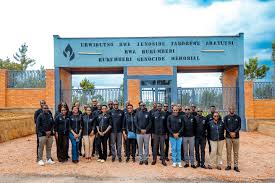Access to Finance Rwanda (AFR) has honoured victims of the 1994 Genocide against the Tutsi during a memorial event held at Rukumberi in Ngoma District, Eastern Rwanda. The organisation also donated cows to poor families of survivors and promised continuous support to help improve their daily lives.
The visit took place on Wednesday, April 30, 2025, at the Rukumberi Genocide Memorial. The event attracted key figures including the Chief Executive Officer of Access to Finance Rwanda, Mr. Jean Bosco Iyacu, and the Mayor of Ngoma District, Ms. Niyonagira Nathalie. Staff members of the organisation also joined in the activities, which were part of their annual outreach efforts to support communities affected by the genocide.
Rukumberi, which used to be part of the former Sake Commune, holds a painful history. It was once a remote location where many Tutsi families were forcefully relocated in the years leading up to the genocide. The area was known for its tsetse fly infestation, making it difficult for survival, but relocation continued over time. During the genocide in 1994, more than 35,000 Tutsi were killed in Rukumberi in a matter of weeks. The killings were marked by extreme cruelty and left long-lasting scars on the survivors and the community.
During the event, AFR officials paid their respects by laying wreaths at the memorial and observing moments of silence in memory of those who lost their lives. After the remembrance activities, AFR donated cows to selected vulnerable families of genocide survivors. The donation, according to the organisers, is meant to help the beneficiaries rebuild their lives through improved nutrition and economic empowerment.
Speaking during the ceremony, Mr. Jean Bosco Iyacu said the organisation has made it a tradition to support survivors every year. He said the support is not just about donations, but about helping families solve long-term problems they still face many years after the genocide.
“Every year we return to show solidarity with genocide survivors. Beyond giving out cows, there are still serious challenges these families face. We will keep talking to them, listening, and finding new ways to support them according to their current needs. Our support will continue to be meaningful and well-organised,” Mr. Iyacu said. He also said the culture of donating cows, known locally as Gira Inka, is something worth preserving as it aligns with Rwandan values and promotes community development.
One of the beneficiaries, Mrs. Mukandori Françoise, who lives in Rukumberi Sector, thanked Access to Finance Rwanda for the gesture. She said her family used to survive on milk before the genocide, but lost everything and struggled to recover. Receiving a cow, she said, brings hope.
“We are grateful that you remembered us. Your kindness is helping us stand again. Before the genocide, we had cows and milk. Losing that changed our lives. Now we can dream again. We promise to also help others by sharing the milk and passing on the cow in the future,” she said emotionally.
Mayor Niyonagira Nathalie also praised the initiative. She said supporting survivors of the 1994 genocide remains a priority for the district government. She added that Ngoma District will continue to work with partners to meet the survivors’ urgent needs, including rebuilding homes, providing social welfare, and ensuring access to livestock like cows, which are important in improving rural livelihoods.
The mayor further said that while the survivors have made significant progress in rebuilding their lives, some still face challenges that require attention. She called on more organisations and individuals to join hands in supporting development and healing in survivor communities.
Ngoma District is home to six official genocide memorial sites. The Rukumberi Genocide Memorial, where the event was held, holds the remains of over 42,000 victims of the 1994 Genocide against the Tutsi. These memorials serve as a reminder of the country’s painful past and the importance of unity and peace in preventing such events from happening again.
Access to Finance Rwanda, which works to improve financial inclusion and promote economic growth in Rwanda, has been involved in various community projects over the years. The organisation supports financial access for smallholder farmers, women entrepreneurs, and vulnerable groups through partnerships and financial literacy programs.
This year’s visit to Rukumberi is part of AFR’s ongoing commitment to social responsibility and national unity. Staff members who attended the event said they were moved by the stories of survival and resilience shared by community members and pledged to continue supporting similar initiatives across the country.
